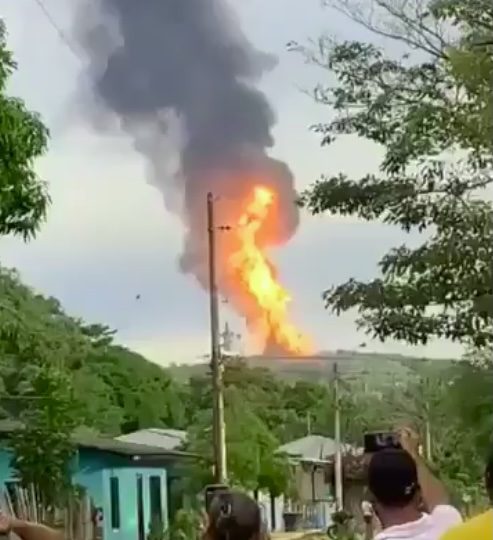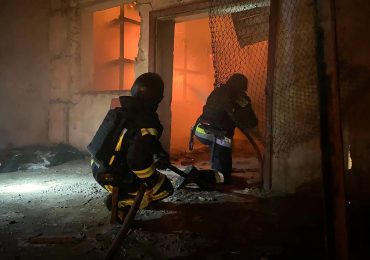INCREDIBLE camera footage caught the moment an active mud volcano exploded and spewed a fiery column of lava in a rare show.
Terrified locals were heard screaming and shouting after an eerie ring of smoke was seen at the top of the San José de Mulatos volcano in Colombia.
Jam PressFootage shows the San Jose Mulatos Volcano erupting and bursting into flame[/caption]
Jam PressA mushroom cloud of thick smoke was seen above the volcano[/caption]
Jam PressA huge ring of smoke was seen at the top of the volcano[/caption]
Footage shot by onlookers showed the moment the volcano began spitting fire.
The active volcano, which was already bubbling with fury, sent a dense cloud of mud and ash into the sky after exploding.
However, in a rare occurrence, a huge ring of smoke was seen at the top of the volcano in a scene straight out of an apocalyptic movie.
The dramatic moment took place in Turbo, Antioquia, Columbia, where volcanic activity is very rare.
No serious injuries have been reported so far but some locals are understood to have fainted following the volcano’s dramatic burst out.
A few people were treated for smoke inhalation and serious coughing.
Some 109 families were affected by the eruption, with many abandoning their homes to protect themselves from the volcano’s wrath.
About 65 indigenous families, 35 peasant families and nine other families live close to the volcano.
Alejandro Abuchar, mayor of the region, said: “There were some children who suffered some health problems due to smoke inhalation, these minors were transferred to the San Pedro hospital and we are taking action to care for the entire population.”
Experts from the Geological Service and Risk Management are carrying out assessment work in the area.
Governor Andrés Julián Rendón assured that all protocols with Risk Management were being followed.
The volcano exploded on November 10 at around 5pm local time.
It comes after 10 people were killed in a massive volcano eruption in Indonesia.
The eruption at Mount Lewotobi Laki Laki around midnight spewed thick brownish ash as high as 2,000 meters (6,500 feet) into the air.
Hot ashes hit several villages, burning down houses including a convent of Catholic nuns.
Images shared by authorities showed the evening sky over the volcano turned red due to the eruption, while footage showed some wooden houses on fire and mask-wearing residents being evacuated.
National Disaster Management Agency spokesperson Abdul Muhari said rescuers were still searching for more bodies buried under collapsed houses.
Muhari added all the bodies, including a child, were found within a 2.4-mile radius of the crater.
Agusta Palma, the head of Saint Gabriel Foundation which oversees convents on the island said a nun in Hokeng village died and another was missing.
She added: “Our nuns ran out in panic under a rain of volcanic ash in the darkness.”
Hadi Wijaya, a spokesperson for The Center of Volcanology and Geological Hazard Mitigation (PVMBG), said: “After the eruption, there was a power outage and then it was raining and big lightning which caused panic among residents.
Indonesia sits on the “Pacific Ring of Fire”, an area of high seismic activity atop multiple tectonic plates.
Lewotobi Laki-laki is one of the 120 active volcanoes in Indonesia, an archipelago of 280 million people.
The latest eruption is Indonesia’s second volcanic eruption in as many weeks.
West Sumatra provinces Mount Marapi, one of the country’s most active volcanos, erupted on October 27, spewing thick columns of ash at least three times and blanketing nearby villages with debris, but no casualties were reported.
In May, flash floods and cold lava flow from Mount Merapi killed more than 60 people.
How entire Atlantic Ocean will be SEALED OFF by impassable volcano range
By Aliki Kraterou, Senior Foreign Reporter
THE entire Atlantic Ocean is set to be sealed off by a fierce volcano range known as The Ring of Fire.
The unique phenomenon happens due to the movement of the tectonic plates which would lead to the closure of the ocean in the Strait of Gibraltar.
But for those planning a Spanish getaway don’t worry – it will take another 20 million years.
The geological phenomenon happens when tectonic plates push another forming new subduction zones – causing the ocean to shut itself off.
The newly-formed range is characterised by active volcanoes and frequent earthquakes, according to National Geographic.
As the rock melts and becomes magma is so close to the Earth‘s surface that it is the perfect place for high volcanic activity.
There is currently one ring of fire in the world in the Pacific Ocean stretching from Australia to South America.
It covers a number of countries from the US and Japan to Argentina, Chile, Mexico, Russia, the Philippines and New Zealand.
It is home to 75 per cent of the earth’s volcanoes and where 90 per cent of the Earth’s earthquakes occur.
However, experts predict it could have some competition in the future as a new subduction zone, under the Strait of Gibraltar will be formed in the Atlantic eventually creating a new Ring of Fire.
Read the full story here.
Jam PressThe volcano sent a dense cloud of mud and ash into the sky after exploding[/caption]
Jam PressTerrified locals were heard screaming in horror[/caption]
Leave a comment








